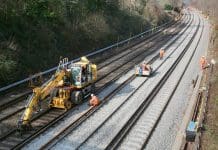UK construction activity fell during February, ending a ten-month period of sustained expansion, as a drop in commercial building and civil engineering activity was heavily to blame
A soft patch for new orders so far in 2019 meant that job creation remained subdued in February. Survey respondents repeatedly cited concerns about a lack of new construction and infrastructure projects to replace completed contracts.
At 49.5 in February, down from 50.6 in January, the seasonally adjusted IHS Markit/CIPS UK Construction Total Activity Index registered below the 50.0 no-change threshold for the first time since the snow disruptions seen in March 2018.
Residential work was the best performing area of construction activity in February, with growth recorded for the thirteenth month running. However, the rate of expansion was only modest.
Anecdotal evidence from survey respondents suggested that Brexit uncertainty had slowed decision-making on commercial projects and led to subdued client demand so far this year.
Fragile order books and a renewed decline in construction output meant that employment growth remained much softer than seen in the final quarter of 2018. Among those companies reporting an increase in staffing numbers, there were some reports that extra trainees had been taken on to help alleviate skill shortages.
The index measuring business expectations for the year ahead remained positive, but the degree of confidence eased to a four-month low and was well below the long-run survey average.
Input buying fell for the first time since September 2017, reflecting softer demand. However, suppliers’ delivery times lengthened to the greatest extent since last August.
Tim Moore, Economics Associate Director at IHS Markit said: “The UK construction sector moved into decline during February as Brexit anxiety intensified and clients opted to delay decision-making on building projects.
“Construction companies pared back their purchasing activity in response to subdued demand in February, but delivery delays for inputs were among the highest seen over the past four years. Survey respondents noted that stockpiling efforts by the UK manufacturing sector had an adverse impact on transport availability and supplier capacity across the construction supply chain.
“On a more positive note, input price inflation held close to January’s two-and-a-half year low. The slowdown in cost pressures from the peaks seen in the first half of 2018 provides a signal that the worst phase has passed for supplier price hikes related to sterling depreciation.”
















